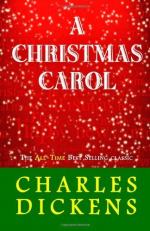|
This section contains 1,187 words (approx. 4 pages at 300 words per page) |

|
SOURCE: “Scrooge, Falstaff, and the Rhetoric of Indigence,” in English Language Notes, Vol. 32, No. 3, March, 1995, pp. 43–6.
In the following essay, Simmons detects the influence of William Shakespeare's character Falstaff on the protagonist of A Christmas Carol.
During his lifetime, Charles Dickens read a vast array of literature, and none influenced him more than the plays of William Shakespeare. Dickens so revered Shakespeare's work that his friend John Forster noted that they celebrated Shakespeare's birthday “always as a festival,”1 and in fact Dickens's prize possession was a pocket edition of Shakespeare's plays that he carried with him constantly. Forster had given him the book as a gift, and Dickens later wrote to Forster to thank him, commenting, “What an unspeakable source of delight that book is to me!”2
Of all of Shakespeare's characters, Dickens's favorite was by far Falstaff from 1 Henry IV, 2 Henry IV, and The Merry Wives of...
|
This section contains 1,187 words (approx. 4 pages at 300 words per page) |

|


